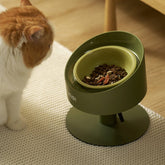How to Care for a Sick Cat: Expert Tips on Medication, Diet, and Comfort

Caring for a sick cat can be a daunting task, especially for new cat owners. It requires a lot of patience, understanding, and a knack for following veterinary advice. But don't fret! With the right tips and techniques, you can become a pro at sick cat care. Let’s dive into expert advice on medication, diet, and comfort to ensure your feline friend gets back on their paws in no time.
Administering Medication
Giving medication to a cat can be like trying to bathe a cat – tricky and met with resistance. Here are some foolproof methods to ease the process:
-
Pill Popper: This handy tool helps you place pills directly into your cat's throat without risking your fingers.
-
With Food: Hide the pill in a small, irresistible treat or a bit of wet food. Your cat might just gobble it up without noticing.
-
Pill Crusher: Crush the pill and mix it with food or water, but always check with your vet first to ensure it's safe.
-
Liquid Medication: Use a syringe to mix with food or administer directly. Place the syringe behind your cat’s canine teeth and angle it to the side of the mouth to ensure they swallow.
Diet for Sick Cats
A balanced diet is crucial for recovery, and it’s not just about what they eat, but how they eat.
-
High-Energy, Palatable Food: Offer small, frequent meals of highly digestible food. Warming the food can make it more appealing, turning your cat into a more willing eater.
-
Avoid Certain Foods: Steer clear of fatty meats, carbohydrates, dairy, and raw foods, as they can be hard on your cat’s digestive system.
-
Hydration: Keeping your cat hydrated is key. Ensure they drink enough water. If they’re not keen on drinking, administer fluids via syringe or consult your vet about subcutaneous fluids.
Comfort and Environment
Creating a comforting environment can significantly aid your cat's recovery.
-
Warm and Quiet Space: Ensure your cat has a warm, dry, and quiet area to rest. Use additional heat sources like heating pads (on low) if necessary.
-
Essentials Nearby: Place food, water, and a low-sided litter box close to your cat’s resting area to minimize movement and keep things within easy reach.

Monitoring Symptoms
Regularly monitoring your cat's condition helps catch any issues early and ensures they’re on the mend.
-
Behavioral Changes: Be on the lookout for signs such as lethargy, loss of appetite, or changes in grooming habits. These can indicate how your cat is feeling.
-
Physical Symptoms: Check for signs of pain, fever, or discharge from wounds or orifices. Any unusual symptoms should be discussed with your vet immediately.
Wound Care
Proper wound care is essential to prevent infections and promote healing.
-
Stop Bleeding: Apply direct pressure with a sterile gauze or clean cloth.
-
Clean the Wound: Use a mild antiseptic solution or warm water. Avoid harsh chemicals unless prescribed by your vet.
-
Bandaging: If necessary, bandage the wound to protect it from further contamination. Ensure the bandage is not too tight to restrict circulation. Always consult your vet for the best practices in handling wounds or injuries.
Grooming
Sick cats often stop grooming themselves, which can lead to other health issues.
-
Daily Brushing: Gently brush or comb your cat to keep their fur clean and remove any discharge from the eyes, nose, or mouth.
-
Cleaning Discharge: Use warm, wet cotton balls or a soft cloth to clean any discharge. Keeping your cat clean helps them feel better.
Follow Veterinary Advice

Your vet is your best ally in this situation, so always follow their instructions closely.
-
Medication and Dosage: Administer medications exactly as prescribed and ensure you complete the full course of treatment.
-
Dietary Restrictions: Stick to any dietary recommendations or restrictions given by your vet. They know what’s best for your cat’s condition.
Encouraging Eating
Getting a sick cat to eat can be challenging, but it's crucial for their recovery.
-
Tempting Foods: Offer strong-smelling foods like chicken or tuna. Warming the food can enhance its aroma, making it more appealing.
-
Hand Feeding: Try feeding small amounts by hand or dabbing food on your cat’s lips. Sometimes a little extra TLC is all they need.
Handling and Restraint

Proper handling can reduce stress and make the treatment process smoother.
-
Gentle Restraint: Wrap your cat in a towel with only its head exposed when administering medication or cleaning wounds. This technique, known as the "kitty burrito," helps keep them calm and secure.
-
Positive Reinforcement: Praise and reward your cat after administering medication or treatment to create a positive association. A little treat can go a long way!
Emergency Signs
Knowing when to seek immediate veterinary help is crucial.
-
Worsening Condition: If your cat’s condition worsens or new symptoms appear, contact your vet immediately.
-
Infections: Signs of infection like fever, pus, or severe discomfort require prompt veterinary attention. Don’t wait – it’s better to be safe than sorry.
Conclusion
Caring for a sick cat requires attention to detail, patience, and a lot of love. By following these tips on medication, diet, and comfort, you can help your feline friend recover more quickly and comfortably. Remember, always follow your vet’s advice and monitor your cat’s condition closely. With the right care, your cat will be back to their playful, purring self in no time. Happy cat caring!























